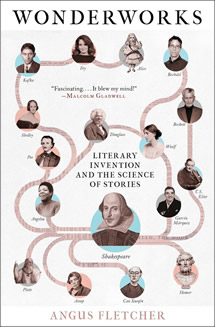Reviewed by Rama Gaind.
By Angus Fletcher, Swift Press, $19.99.
 Literary invention and the science of stories is at the core of an enlivening and amazing compilation that is Wonderworks.
Literary invention and the science of stories is at the core of an enlivening and amazing compilation that is Wonderworks.
It reviews the blueprints for 25 of the most significant developments in the history of literature. These inventions can be scientifically shown to alleviate grief, trauma, loneliness, anxiety, numbness, depression, pessimism and ennui, while sparking creativity, courage, love, empathy, hope, joy and positive change.
They can be found throughout literature — from ancient Chinese lyrics to Shakespeare’s plays, poetry to nursery rhymes and fairy tales and crime novels to slave narratives.
Literature is a technology like any other. And the writers we revere — from Homer, Shakespeare, Austen, and others — each made a unique technical breakthrough that can be viewed as both a narrative and neuroscientific advancement. Literature’s great invention was to address problems we could not solve: not how to start a fire or build a boat, but how to live and love; how to maintain courage in the face of death; how to account for the fact that we exist at all.
It “teaches you everything you wish you learned in your English class, and “contains many instances of critical insight …. What’s most interesting about this compendium is its understanding of imaginative representation as a technology.”
Here is a tour of thousands of years of literature that takes a radically different approach from any you may have previously encountered:
“…The emphasis is on invention, and it shows us why invention in literature is as valuable and brilliant as invention in microbiology or quantum physics. There are dozens of works of literature described in a refreshingly new way in this book … It is a literary feast, and every work of literature is fresh and new under Fletcher’s microscope.” — Bob B., VP, Executive Editor, on Wonderworks



